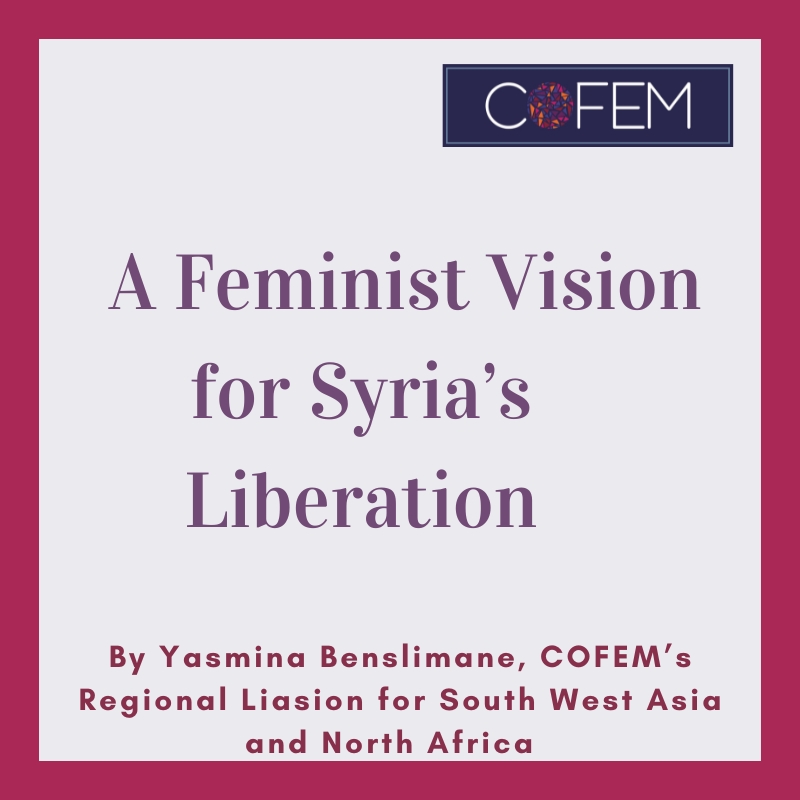As COFEM, we stand in solidarity with the Syrian people as they mark the fall of Bashar al-Assad’s oppressive regime. This is a historic moment, but one that must be met with caution and resolve. Liberation does not begin and end with the removal of a dictator. True freedom for Syria requires dismantling the systemic violence, particularly gender-based violence (GBV), that has long shaped the experiences of women and girls, especially those from marginalized communities like Kurdish women and survivors of war crimes.
The Gendered Costs of Conflict
The Syrian Civil War has left an indelible mark on its women and girls, who have borne the brunt of unimaginable atrocities. Sexual violence has been weaponized as a tool of war, used to terrorize and control. Stories like that of a young woman imprisoned in Sednaya at 19, endured years of sexual violence and now rebuilds her life while raising children born from this trauma are not isolated, they represent the lived experiences of thousands of survivors. The collapse of Assad’s regime and the destruction of his prisons, notorious for their brutality, should also signal the collapse of the silence and impunity that have surrounded these atrocities. However, the fight for justice cannot stop at freeing political prisoners or holding war criminals accountable. It must extend to dismantling the patriarchal systems that enable GBV to persist in households, communities, and governance structures.
One feminist leader highlighted, “Many women freed from Assad’s prisons remain terribly neglected. They face social stigma, lack psychological and social support, and are often excluded from legal redress. Trained and specialized help is urgently needed to support these women.”
A Feminist Framework for Syria’s Future
Syria’s liberation must be rooted in a decolonial and intersectional feminist approach that centers women and girls’ voices, leadership, and lived experiences.
To ensure true justice and equality, the following priorities are essential:
- Justice and Accountability for GBV
Perpetrators of sexual violence and other war crimes must face international justice. Survivors deserve access to comprehensive reparations, psychosocial support, and economic empowerment programs that recognize their agency and resilience. Accountability mechanisms must also address cultural and systemic enablers of violence, including intimate partner violence (IPV) and early forced marriages. - Women’s Leadership and Equal Representation
Syrian women, particularly Kurdish women and grassroots organizers, have been architects of the revolution, yet they remain sidelined in political decision-making. This cannot continue. Transitional governance and post-conflict rebuilding efforts must ensure women’s full representation and leadership, particularly those from historically marginalized groups. As noted by Vian Hussein, a Kurdish feminist leader, “We are deeply concerned about the hidden roots of ISIS within the new government. If Syria follows the path of Iran, with Islamic extremism in the lead, women’s lives will become far more difficult.” - Dismantling Patriarchal Norms Across Spheres
The fight for justice must extend into the home and community, challenging cultural norms that perpetuate violence against women and girls (VAWG). Early forced marriages, restrictions on women’s autonomy, and other forms of systemic oppression must be addressed with urgency. - Recognizing and Uplifting Marginalized Voices
Kurdish women, who have long resisted both ethnic and GBV, must play a central role in shaping Syria’s future. Their leadership, particularly within the Syrian Democratic Forces (SDF) and grassroots feminist movements, offers a model for building an inclusive, pluralistic society. - Funding Grassroots Feminist and Youth-Led Initiatives
International and local actors must prioritize funding grassroots feminist and youth-led movements addressing GBV. Flexible, long-term funding is essential to sustain their efforts, amplify marginalized voices, and implement survivor-centered programs, ensuring resources reach those driving change on the ground.
Revolutionizing Liberation
As feminist revolutionary Razan Zaitouneh once reminded us, “We did not sacrifice thousands of lives for a revolution that simply replaces one form of oppression with another.” Syria’s revolution cannot stop at regime change; it must dismantle the patriarchal and colonial structures that uphold VAWG. This includes challenging both visible and invisible forms of oppression, from systemic GBV to societal norms that restrict women’s rights and freedoms. Liberation is not a singular event but an ongoing process. The transitional period must be a time of bold feminist action, embedding gender justice into every layer of reconstruction. Women’s liberation is not a side issue or a matter to be deferred. It is the cornerstone of true freedom and equality for all Syrians.
A Call to Action
To the international community, feminist coalitions, and grassroots organizers: this is a moment to act decisively. Advocate for gender-inclusive governance that amplifies women’s voices and prioritizes their leadership. Support survivors of GBV not as victims but as leaders and agents of change. Invest in transformative, intersectional solutions that address the compounded impacts of age, gender, ethnicity, and socio-economic marginalization.
The fall of Assad’s regime is only the first step toward liberation. Syrian women and girls, particularly those from marginalized communities, have carried this revolution on their backs. Now, they must lead its rebuilding. Let us honor their sacrifices, amplify their voices, and work alongside them to build a Syria where equity, dignity, and freedom are not just aspirations but realities.
